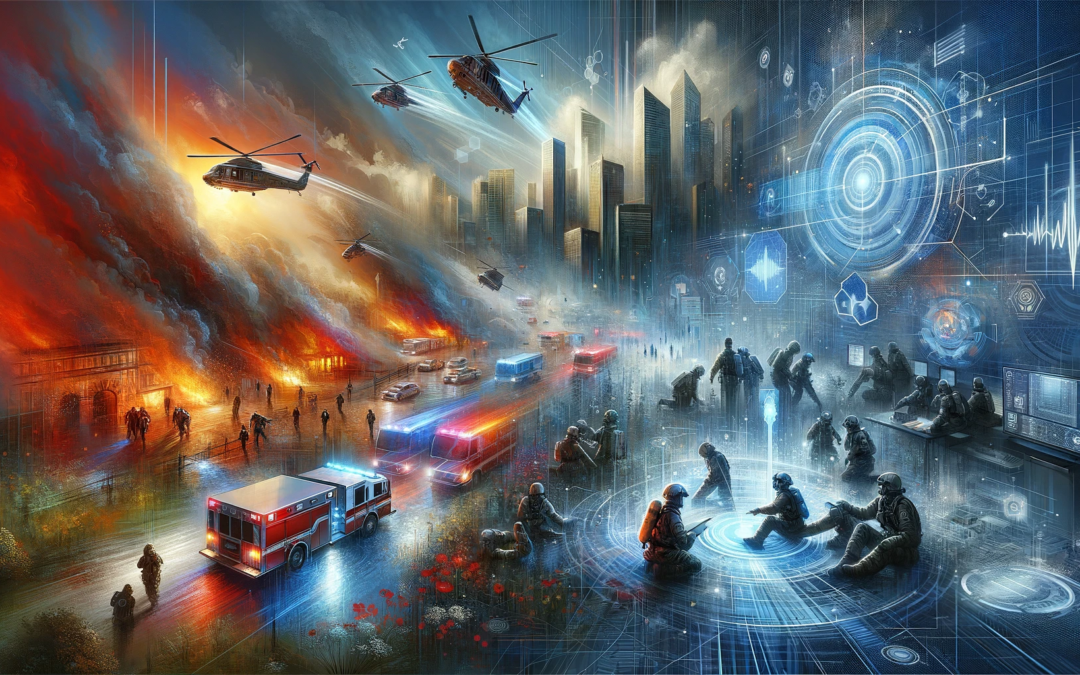Public safety and emergency response systems face numerous challenges in their mission to protect and serve communities. However, with the emergence of AI, these critical services are being revolutionized. In this blog post, we will explore how AI technologies are not only improving emergency services and response times but also aiding in predictive policing, disaster management, and public health crisis management.
AI in Emergency Response and Management
AI plays a crucial role in enhancing emergency response times, resource allocation, and coordination during crises. For instance, AI-driven systems can analyze real-time data to identify the most efficient routes for emergency vehicles, reducing response times significantly. Additionally, AI-powered tools can assist in resource management, ensuring that the right personnel and equipment are deployed to the right locations at the right time.
AI in Predictive Policing and Crime Prevention
Predictive policing is another area where AI is making a substantial impact. By analyzing vast amounts of data, AI algorithms can identify patterns and trends that humans might overlook. This enables law enforcement agencies to allocate resources strategically and prevent crimes before they occur. Several cities have already seen significant reductions in crime rates due to the implementation of AI-driven predictive policing strategies.
AI in Disaster Preparedness and Relief
When it comes to disaster management, AI tools are proving to be invaluable. AI can analyze historical data and environmental factors to predict the likelihood and severity of natural disasters. This enables authorities to take proactive measures such as evacuations and resource mobilization. During relief operations, AI can assist in coordinating efforts, optimizing supply chains, and even simulating disaster scenarios to aid in planning.
AI in Public Health Crisis Management
Managing public health crises requires swift and accurate decision-making. AI is playing a crucial role in tracking disease spread, analyzing data from various sources, and assisting healthcare professionals in resource allocation. For example, AI algorithms can analyze symptoms, demographics, and geographical data to identify potential outbreak hotspots, allowing authorities to take timely action. The ongoing COVID-19 pandemic has highlighted the importance of AI in managing public health emergencies.
Challenges and Ethical Considerations
While the potential of AI in public safety and emergency response is immense, it is essential to address the challenges and ethical considerations associated with its use. Privacy concerns, data accuracy, and the potential for misuse are among the key issues that need to be carefully navigated. Organizations must prioritize responsible AI practices, ensuring transparency, fairness, and accountability in their AI-driven systems.
The Future of AI in Public Safety
The future of AI in public safety and emergency response is both exciting and thought-provoking. As AI continues to advance, we can expect even more sophisticated tools and systems that will further transform these critical fields. However, as we embrace these advancements, it is crucial to question the long-term impact of AI on human-centric approaches and societal well-being. Striking the right balance between technological innovation and ethical considerations is paramount.
Engaging with the Audience
We invite you, our readers, to share your thoughts and experiences with AI-driven public safety or emergency response tools. Let’s engage in discussions about the potential benefits and challenges of integrating AI into these services. Together, we can shape the future of public safety and emergency response in the age of advanced AI.
Conclusion
AI has the potential to revolutionize public safety and emergency response, safeguarding society in ways never before imagined. By leveraging AI technologies, we can enhance emergency services, predict and prevent crimes, manage disasters effectively, and respond swiftly to public health crises. However, it is crucial to approach these advancements with a strong focus on ethics and human-centric approaches. Only by striking the right balance can we fully harness the power of AI to protect and serve our communities.
Visual Elements:
Image: AI-powered emergency response coordination platform
Image: AI-driven predictive policing tool
Image: AI-assisted disaster management simulation
SEO Elements:
By delving into the role of AI in public safety and emergency response, we can envision a future where technology works hand in hand with human expertise to create safer and more resilient communities. Let’s embrace the potential of AI while ensuring that our ethical compass guides us in harnessing its power for the greater good.










